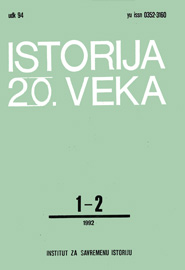IDEOLOŠKE OSNOVE JUGOSLOVENSKIH UNUTRAŠNJIH RAZGRANIČENJA
THE IDEOLOGICAL BASIS OF INNER BORDER DEMARCATION IN YUGOSLAVIA
Author(s): Momčilo ZečevićSubject(s): Geography, Regional studies, Political history, Recent History (1900 till today), Pre-WW I & WW I (1900 -1919), Interwar Period (1920 - 1939), WW II and following years (1940 - 1949), History of Communism, Geopolitics
Published by: Institut za savremenu istoriju, Beograd
Keywords: Yugoslavia; inner borders; ideological basis; border demarcation; communism;
Summary/Abstract: The author draws our attention to the significant role which confrontations in the ideological and religious sphere played in the definition of Yugoslav inner borders in the period of the unified state, from 1918 to our time, He points out the influence of nationalistic ideologies in bourgeois Yugoslavia, primarily fostered by the Serbs and Croats, the conflict between these ideologies and the inter political idea of Yugoslavia and their effect on the model of Yugoslav integration (disintegration) under communist rule. The Croatian-Slovenian dualistic approach to the organization of the state in Yugoslavia and Serbian ideas of integration corresponded directly to each people’s position and level of national emancipation. In terms of global relations in Yugoslavia, another determining factor in national confrontation, especially between Serbs and Croats, was religion. Appearing alongside other ideological influences which affected national politics in bourgeois Yugoslavia, but also during communist dictatorship, Catholic expansionism manifested itself as the most persistent force. As it turned out, it played a dominant part in determining the position of Yugoslavia’s inner borders. It is necessary, in the author's opinion, when dealing with the topic of inner border demarcation in Yugoslavia to consider not only standard determining factors, such as historical right, administrative and economic norms etc., but also to take into account the dominant political and religious ideologies then existent in the Yugoslav state and their historical roots and influence.
Journal: Istorija 20. veka
- Issue Year: 1992
- Issue No: 1+2
- Page Range: 171- 181
- Page Count: 11
- Language: Serbian

